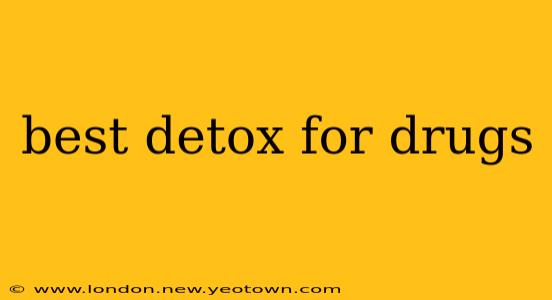The road to recovery from drug addiction is paved with challenges, but one of the most crucial initial steps is detoxification. This isn't a simple process, and there's no single "best" detox for drugs because the optimal approach depends heavily on the specific substance(s) used, the individual's health, and other factors. Think of it less as a one-size-fits-all solution and more like a personalized journey guided by medical professionals. This article will explore the complexities of drug detox and answer some common questions surrounding this critical phase of recovery.
What is Drug Detoxification?
Drug detoxification, or detox, is the medically supervised process of safely withdrawing from drugs. It's a crucial first step in addiction treatment, aimed at managing the often dangerous and uncomfortable symptoms of withdrawal. It's important to remember that detox is not a cure for addiction; it's merely the first step on a longer path toward recovery. Think of it as preparing the ground before you can plant the seeds of a healthier future.
What are the Different Types of Drug Detox?
The approach to detox varies greatly depending on the substance. Some drugs, like opioids, require medically assisted detox due to the severe and potentially life-threatening withdrawal symptoms. Others, while still challenging, may be managed with less intensive support. There are several options:
- Medically Supervised Detox: This is often the safest and most effective approach, especially for substances with severe withdrawal symptoms. Medical professionals monitor vital signs, administer medications to manage withdrawal symptoms, and provide overall support. This is especially crucial for opioids, benzodiazepines, and alcohol.
- Inpatient Detox: This involves staying at a residential facility for the duration of the detox process. It provides 24/7 medical monitoring and support, offering a structured environment to focus solely on recovery.
- Outpatient Detox: This allows individuals to detox while living at home, typically with regular check-ins with medical professionals. This option is generally suitable for individuals with less severe withdrawal symptoms and a strong support system.
How Long Does Drug Detox Take?
The duration of detox varies greatly depending on the drug, the individual's health, and the severity of their addiction. It can range from a few days to several weeks. There's no one-size-fits-all answer; it's a personalized journey guided by medical professionals.
What are the Symptoms of Drug Withdrawal?
Withdrawal symptoms can be incredibly uncomfortable and even life-threatening, depending on the drug. Common symptoms include:
- Anxiety and irritability: Feeling restless, on edge, and easily agitated.
- Nausea and vomiting: Experiencing gastrointestinal distress.
- Muscle aches and pains: Physical discomfort throughout the body.
- Insomnia: Difficulty sleeping or staying asleep.
- Sweating and chills: Flu-like symptoms.
- Severe cravings: An overwhelming urge to use the drug again.
It's crucial to seek professional medical help during withdrawal to manage these symptoms safely and effectively. Attempting to detox alone can be extremely dangerous.
What Medications are Used in Drug Detox?
The medications used during detox depend on the substance being detoxified. They are carefully chosen to manage withdrawal symptoms, reduce cravings, and minimize the risk of complications. These medications are administered under strict medical supervision.
What Happens After Detox?
Detox is just the first step. Successful long-term recovery requires ongoing treatment, such as therapy, counseling, and participation in support groups like Narcotics Anonymous or Alcoholics Anonymous. This continuous support is crucial for maintaining sobriety and preventing relapse. Relapse is a common part of the recovery process, and it's vital to view it as an opportunity for learning and readjustment rather than a failure.
The journey to recovery is a personal and challenging one, but with the right support and resources, it is possible. Finding the right detox program and the subsequent ongoing treatment is critical to success. It’s essential to consult with a healthcare professional or addiction specialist to determine the best course of action. They can assess your specific needs and recommend a tailored plan for your individual circumstances. Remember, recovery is possible.

